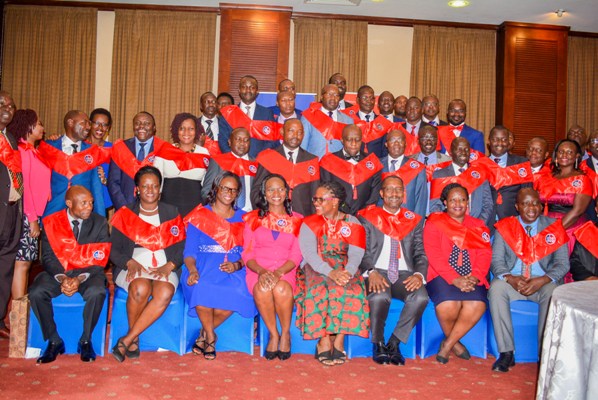Commissioner Ruzigye (in neck tie) and other stakeholders in the fight against drowning
The Ministry of Works and Transport is encouraging Ugandans to take swimming as a life skill, amidst calls to take it to schools.
This is part of the wider efforts by a partnership between the government, Reach A Hand Uganda (RAHU), Design Without Borders and Makerere University School of Health Sciences.
The partnership is working towards reducing drowning incident deaths by at least 25 percent from the current 3,000 per year, targeting incidents at beaches, fishing and travels, among others.
Speaking ahead of the World Drowning Prevention Day due this Friday, Charles Ruzigye, the Commissioner Maritime Administration at the Ministry of Works and Transport lamented that drowning thrives on failure by water users to appreciate the risks involved and take precautions.
These include use of life jackets, checking the seaworthiness of boats, and using alcohol and drugs, among others, when on water.
“The main challenge is that many of us think we don’t need life jackets, especially when enjoying trips and boat cruises until you feel that the situation is getting troublesome and by the time that happens, it’s already too late,” he said,
He says the purpose of the day’s commemoration is to create awareness about drowning, to remember those that have lost lives and loved ones, review the efforts and look to strengthen them, among others.
According to Ruzigye, the government is continuing to roll out the establishment of Water Search and Rescue Centres at major water bodies, installing weather data centres on lakes and enforcing the regulations under the Inland Water Transport Act of 2021.
These include; registration, certification and inspection of all water vessels including passenger boats, canoes and large ferries; enforcing life jackets standards and use; and training of personnel.
He says, however, that the marine police have the mandate to enforce the regulations, saying that any vessel found on water without the requirements, is supposed to be impounded and the operators arrested.
Ruzigye commended RAHU on the efforts including sensitising communities about the risks when traveling on water, visiting beaches or fishing, and supported the training of people in survival skills.
The initiative will also include taking the skills training to more people including the schools so as to have more Ugandans have enhanced abilities to survive drowning. Knowing how to swim is important, but not enough, according to Humphrey Nabimanya, CEO RAHU, the reason giving survival skills, even to swimmers is important.
He says their Drowning Prevention Programme has been supported by the views of the survivors of the 2018 (MV Templar) disaster that claimed dozens on Lake Victoria.
Nabimanya says because of the locations and the number of people involved per drowning incident, it has not been considered a serious issue despite claiming thousands per year.
“Drowning is a silent public health crisis that continues to claim lives, particularly among children and youth living in our lakeside and hard-to-reach communities that depend on water as a primary source for livelihoods,” he says, adding, “We believe all young people have the right to thrive and live in safety. That’s why we collaborate with government agencies and partners to support grassroots prevention efforts and provide communities with essential life-saving skills.”
The main events on Friday will be held in Mayuge District, which, according to research led by Makerere University, has the highest number of drowning deaths in the country.
Apart from fishing being the major source of livelihoods and a big community living along and using the lake shores daily, thousands travel between the numerous Islands and the mainland for trade and services like healthcare and education.
Uganda suffers the highest death rate from drowning in lakeside communities globally, while generally, it is among the top three, making drowning a silent but avoidable killer, according to Dr. Fredrick Oporia from Makerere University School of Public Health.
He says drowning should be taken as seriously as any other top killer because the people who die are both voters and taxpayers, yet they die looking for survival.
On his part, Onyum Charlse Okao, Media Coordinator at Global Health Advocacy Incubator, hailed governments recognition of the problem and efforts being taken, but called for more support from other sectors.
“Government has taken steps to address drowning, but more needs to be done. Let’s support their efforts and work together. It’s time to invest in life-saving actions like swimming and rescue skills, affordable safety gear,” said Okao.
Okao noted that the theme of this year’s World Day of Drowning Prevention, “Telling Stories About Drowning,” aims to raise awareness about the human impact of drowning incidents and emphasize the need for action to prevent such tragedies.
-URN





